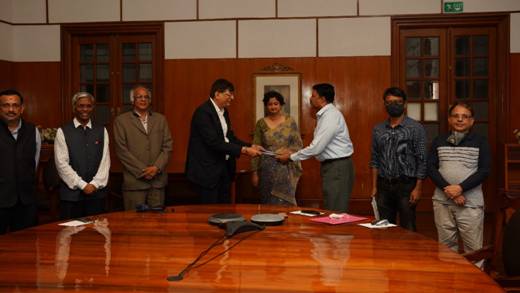BeST cluster and BCIC sign MoU to strengthen technology development ecosystem in Karnataka
Author:

Bengaluru: With the aim of strengthening technology development ecosystem in Karnataka, Bangalore Chamber of Industry and Commerce (BCIC) and the Indian Institute of Science (IISc) – on behalf of Bengaluru S&T (BeST) cluster, have signed a memorandum of understanding entered into a memorandum of understanding (MoU). “The MoU brings together R&D strengths of Bangalore S&T cluster with the expertise and experience of the industries through BCIC to set up a robust and vibrant innovation-driven technology development ecosystem,” said Prof K Vijay Raghavan, Principal Scientific Advisor (PSA) to the Government of India.
BeST is an initiative of the Prime Minister’s Science, Technology & Innovation Advisory Council (PM-STIAC) launched with support from the office of the Principal Scientific Adviser (PSA) to enable R&D of key national missions and solve problems for the Indian and global industry. BeST is one of several national science and technology clusters being established in the country, to ensure better synergy between academic institutions, national and state research laboratories, and other stakeholders like relevant ministries, industry partners, start-ups, MSMEs, state governments, philanthropic foundations, and international organizations.
BCIC, set up in 1976, is the apex chamber of industry and commerce, representing large and medium industries in the state of Karnataka. T R Parasuraman, president, BCIC, said, “This MoU between BCIC and IISc on behalf of BeST cluster will be a huge gateway to promote innovation and research among industries and will deepen industry’s contribution in the country’s national missions.”
BCIC has partnered with BeST to identify opportunities to collaborate on new projects in diverse fields, promote academic and R&D partnerships, and exchange information and technology expertise. BCIC will also support BeST in connecting with corporate partners and encouraging collaborative projects between academia and industry and raising visibility for activities undertaken by BeST.
Prof Ambarish Ghosh, Professor in the Centre for Nano Science and Engineering (CeNSE), IISc, and the co-Principal Investigator of BeST expressed his pleasure on the signing and noted that “entering into this partnership with BCIC for this important initiative, can have a great impact on the S&T ecosystem in the city of Bengaluru.” The partnership is also expected to spur training programmes, webinars, lectures, and educational courses to cater to diverse stakeholders. /BI/
More In Tech Governance
The exports of agricultural commodities from March to June 2020 shot up by 23.24 percent on-year to Rs 25,552.7 crores.
As the economy comes to a standstill amid the coronavirus-led lockdown, India’s agriculture sector has taken the baton of economic growth in its hands. The exports of agricultural commodities from March to June 2020 shot up by 23.24 percent on-year to Rs 25,552.7 crores, according to the Ministry of Agriculture & Farmers Welfare. The government said that self-reliant agriculture is critical for the goal of an Atmanirbhar Bharat and for this, agricultural export is extremely important as besides earning foreign exchange for the country, the exports help farmers, producers, and exporters to take advantage of the wider international market and increase their income.
The surge in exports has also resulted in increased production in the farm sector by increasing coverage area and productivity. The share of India’s agricultural exports and imports in the world agriculture trade in 2017 was 2.27 percent and 1.90 percent, respectively. Even during the difficult time of pandemic lockdown, India took care not to disturb the world food supply chain and continued to export, the government said.
Ministry of Agriculture has prepared a comprehensive action plan for the promotion of Agri trade; the twofold approach focuses on boosting Agri Export with emphasis on value addition and action plan for Import Substitution. Recently, the Agriculture sector has witnessed a series of reforms, giving more choices to the farmers to sell their produce at competitive rates.
To mention a few, the Export strategy focuses on the export promotion of fast-evolving niche markets of Wellness food/ Health-conscious food/nutraceuticals, Development of “Brand India” in campaign mode to help penetration into new foreign markets and of new products which automatically translates into higher value realization, Gulf countries have been identified as focus destination to increase the market share which is a strong market for India though presently India caters to only 10-12% share of their total imports. A product-market matrix has been made containing a list of products of strength that could be expanded in new geographies and a list of known markets which can be introduced with newer products.
At the behest of the Department of Agricultural Cooperation & Farmers’ Welfare, Ministry of Agriculture, product-specific Export Promotion Forums have been created to lead Agri exports to new heights. Each Export Promotion Forum shall be having exporters of the related commodity as its members along with official members representing concerned Ministries/Departments of the Central and State Governments. Chairman APEDA shall be the chairman of each of these forums. The forums will meet at least once every two months, to discuss recommendations on issues pertaining to the export.
The recommendations of the forum will be placed in the product committee / Authority of APEDA. The Forum will keep in close contact with the concerned organization of the Ministry of Agriculture such as MIDH, Extension, NPPO, etc., DGFT, Ministry of Civil Aviation, MoFPI, etc. to further the interest of agricultural export.



